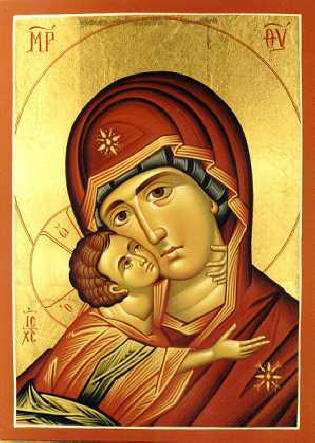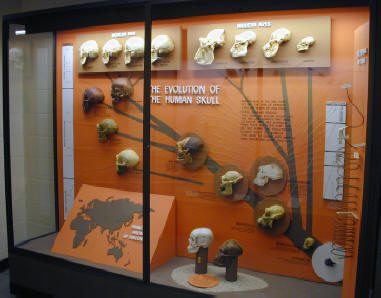|
Believe It, or Not
By NICHOLAS D. KRISTOF
New York Times
August 15, 2003
Americans are three times as likely to
believe in the Virgin Birth of Jesus (83 percent) as in evolution (28
percent).
So this day is an opportunity to look
at perhaps the most fundamental divide between America and the rest of the
industrialized world: faith. Religion remains central to American life, and
is getting more so, in a way that is true of no other industrialized
country, with the possible exception of South Korea.
Americans believe, 58 percent to
40 percent, that it is necessary to believe in God to be moral. In contrast,
other developed countries overwhelmingly believe that it is not necessary.
In France, only 13 percent agree with the U.S. view. (For details on the
polls cited in this column, see response reprinted below.)
|

Madonna and Child |
The faith in the Virgin Birth reflects the way American Christianity is becoming
less intellectual and more mystical over time. The percentage of Americans who
believe in the Virgin Birth actually rose five points in the latest poll.
|

|
My grandfather was fairly typical of
his generation: A devout and active Presbyterian elder, he nonetheless
believed firmly in evolution and regarded the Virgin Birth as a pious
legend. Those kinds of mainline Christians are vanishing, replaced by
evangelicals. Since 1960, the number of Pentecostalists has increased
fourfold, while the number of Episcopalians has dropped almost in half.
The result is a gulf not only between
America and the rest of the industrialized world, but a growing split at
home as well. One of the most poisonous divides is the one between
intellectual and religious America.
|
Some liberals wear T-shirts declaring, "So Many Right-Wing
Christians . . . So Few Lions." On the other side, there are attitudes like
those on a Web site,
dutyisours.com/gwbush.htm, explaining the
2000 election this way:
"God defeated armies of Philistines and others with confusion. Dimpled and
hanging chads may also be because of God's intervention on those who were voting
incorrectly. Why is GW Bush our president? It was God's choice."
The Virgin Mary is an interesting prism through which to examine America's
emphasis on faith because most Biblical scholars regard the evidence for the
Virgin Birth, and for Mary's assumption into Heaven (which was proclaimed as
Catholic dogma only in 1950), as so shaky that it pretty much has to be a leap
of faith. As the Catholic theologian Hans Küng puts it in "On Being a
Christian," the Virgin Birth is a "collection of largely uncertain, mutually
contradictory, strongly legendary" narratives, an echo of virgin birth myths
that were widespread in many parts of the ancient world.
Jaroslav Pelikan, the great Yale historian and theologian, says in his book
"Mary Through the Centuries" that the earliest references to Mary (like Mark's
gospel, the first to be written, or Paul's letter to the Galatians) don't
mention anything unusual about the conception of Jesus. The Gospels of Matthew
and Luke do say Mary was a virgin, but internal evidence suggests that that part
of Luke, in particular, may have been added later by someone else (it is
written, for example, in a different kind of Greek than the rest of that
gospel).
Yet despite the lack of scientific or historical evidence, and despite the
doubts of Biblical scholars, America is so pious that not only do 91 percent of
Christians say they believe in the Virgin Birth, but so do an astonishing 47
percent of U.S. non-Christians.
I'm not denigrating anyone's beliefs. And I don't pretend to know why America is
so much more infused with religious faith than the rest of the world. But I do
think that we're in the middle of another religious Great Awakening, and that
while this may bring spiritual comfort to many, it will also mean a growing
polarization within our society.
But mostly, I'm troubled by the way the great intellectual traditions of
Catholic and Protestant churches alike are withering, leaving the scholarly and
religious worlds increasingly antagonistic. I worry partly because of the time
I've spent with self-satisfied and unquestioning mullahs and imams, for the
Islamic world is in crisis today in large part because of a similar drift away
from a rich intellectual tradition and toward the mystical. The heart is a
wonderful organ, but so is the brain.

The Garden of Eden
KRISTOF:
08:49pm Aug 14, 2003 EST
The most stunning religion survey I found is the one in which 47 percent even of
American non-Christians say they believe in the virgin birth. The source of that
data is a Harris Poll from Aug. 12, 1998, with a sample of 1,011 adults. That
survey found that 94 percent of adults believe in God, 86 percent believe in
miracles, 89 percent believe in Heaven, and 73 percent believe in the Devil and
in Hell.
The comparisons with other countries come from a different source: “Views of a
Changing World, June 2003,” a multi-nation poll conducted by the Pew Global
Attitudes Project, www.people-press.org. Incidentally, the Pew survey finds that
the American emphasis on the need to believe in God to be moral, while rare in
the industrialized world, is common in developing countries like Nigeria and
Pakistan.
The figure for belief in evolution comes from a separate Gallup poll.
There’s been a huge amount of Biblical scholarship on Mary, and I particularly
recommend the two books I mention in the column: Professor Jaroslav Pelikan’s
“Mary Through the Centuries” and Hans Kung’s “On Being a Christian.” There are
many other points that I didn’t have space to mention in the column, of course,
including the fact that some early Christians may have felt pressure to have
Jesus’ birth reflect what they thought was a prophesy in Isaiah of a birth to a
virgin. In fact, that was a mistranslation into Greek of a word more properly
rendered as “young woman.”
A
related issue is the question of whether the Virgin Mary, even if she was a
virgin at the time of conception, remained one through her life. There is no
scriptural support for that idea, and some contradiction in the form of repeated
references to Jesus’ brothers. It is true that the word can also mean cousin,
but the linguists say that in this context it’s a stretch.
I
want to emphasize that my point isn’t to mock anyone’s beliefs. As Kant noted,
matters of faith cannot be proved or disproved; they belong in a separate realm.
I’m simply trying to explore this gulf between the U.S. and the rest of the
industrialized world, and also caution about the growing antagonism between the
religious and intellectual realms.
I’m going to be on vacation for the next week, and then I’ll be traveling in
obscure places, so I’m probably not going to be able to go through emails and
comment on this blog for a couple of weeks. Thus I’d suggest that you direct
comments and criticisms to the nytimes.com forum related to my column.

Cultural Syllabus




